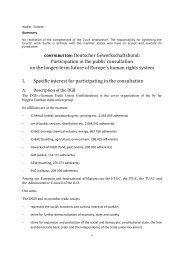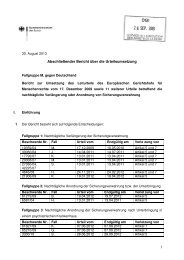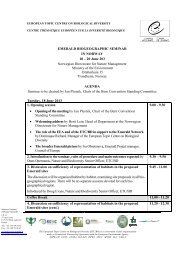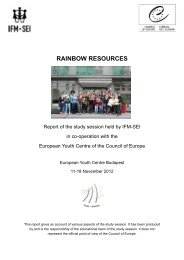LUXEMBOURG - Council of Europe
LUXEMBOURG - Council of Europe
LUXEMBOURG - Council of Europe
Create successful ePaper yourself
Turn your PDF publications into a flip-book with our unique Google optimized e-Paper software.
10<br />
11. What are the existing practices and experiences with regard to international cooperation,<br />
in particular in relation to the procedures described in question 4?<br />
The law enforcement authorities do not perform any proactive monitoring <strong>of</strong> the Internet. Only on<br />
finding an <strong>of</strong>fence covered by the specific provisions <strong>of</strong> the Penal Code on terrorism can the<br />
investigating judge to whom the case is referred issue an order requiring the access provider or the<br />
host <strong>of</strong> the incriminated site to take blocking and/or closure measures. As regards experiences <strong>of</strong><br />
collaboration with foreign police departments in this field, the cases dealt with in this way principally<br />
concerned national investigations focused on the storage or dissemination <strong>of</strong> child pornography,<br />
whereas it has not yet been possible to acquire experience in measures to block sites preaching<br />
terrorism.<br />
D. Institutional framework<br />
12. Please list the institutions that are competent for countering terrorist misuse <strong>of</strong><br />
cyberspace.<br />
The competent institutions are the judicial authorities (prosecution department and investigating<br />
judges) and the Grand-Ducal Police Force. Within the police they are, more specifically, the judicial<br />
police department (Police Judiciaire) and in particular the Anti-Terrorist Unit <strong>of</strong> the General Crime<br />
Section in collaboration with the New Technologies Section for the technical side.<br />
13. In order to counter terrorist misuse <strong>of</strong> cyberspace are there any partnerships between<br />
the public and private sectors or legal obligations for operators <strong>of</strong> electronic<br />
communication (Internet-service providers, hosting companies, etc.) as well as persons<br />
providing the public with access to systems which allow on-line communication via<br />
access to the network (cyber cafe, WiFi hotspot)?<br />
At present there is no specific legal obligation as regards the use <strong>of</strong> cyberspace. Among the<br />
"ordinary" obligations in force in this respect, mention should be made <strong>of</strong> the law <strong>of</strong> 30 May 2005<br />
requiring providers in the communications sector to retain a certain number <strong>of</strong> pieces <strong>of</strong> information<br />
(see excerpt below).<br />
There is no formal partnership between the public and the private sectors, although the relevant<br />
police departments keep up excellent relations with the service providers and their co-operation is<br />
good on the whole.<br />
Law <strong>of</strong> 30 May 2005<br />
– on the specific arrangements to protect the individual as regards the processing <strong>of</strong><br />
personal data in the electronic communications sector, and<br />
– amending Articles 88-2 and 88-4 <strong>of</strong> the Code <strong>of</strong> Criminal Investigation<br />
Article 5. Data on traffic<br />
(1) (a) To meet the needs <strong>of</strong> detecting, determining and prosecuting criminal <strong>of</strong>fences, and for<br />
the sole purpose <strong>of</strong> allowing information to be made available as required to the judicial<br />
authorities, all service providers or operators processing data which relate to traffic are obliged<br />
to retain such data for a period <strong>of</strong> 12 months. A Grand-Ducal regulation shall determine the<br />
categories <strong>of</strong> traffic data which may be <strong>of</strong> use in detecting, determining and prosecuting<br />
criminal <strong>of</strong>fences.<br />
(b) After the period <strong>of</strong> retention prescribed in sub-paragraph (a) above, the service provider or<br />
operator shall delete or render anonymous the traffic data concerning the subscribers and<br />
users.<br />
(…)

















